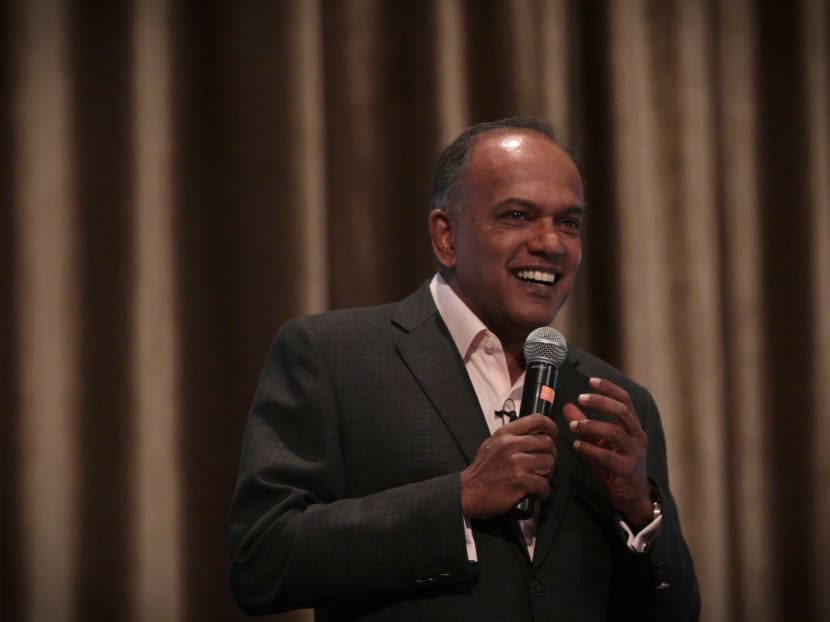Govt to toughen laws to safeguard religious harmony: Shanmugam
SINGAPORE — Laws enacted to maintain religious harmony will be tightened next year, including those forbidding religious leaders from promoting hatred and ill will among different faith groups or furthering political causes, Law and Home Affairs Minister K Shanmugam said on Friday (Sept 8).

Minister K Shanmugam speaks at the IPS Forum on the Reserved Presidential Election on 8 Sept, 2017. Photo: Jason Quah
SINGAPORE — Laws enacted to maintain religious harmony will be tightened next year, including those forbidding religious leaders from promoting hatred and ill will among different faith groups or furthering political causes, Law and Home Affairs Minister K Shanmugam said on Friday (Sept 8).
He also revealed that the Government had “most recently” barred two Christian preachers from entering the country because they had made inflammatory remarks of other religions.
Speaking at a forum on the reserved Presidential Election organised by the Institute of Policy Studies, Mr Shanmugam said: “We have now seen what can happen with clerics (of any religion) all over the world, and how, when they move into the political sphere, wearing their robes, it becomes very dangerous. We don’t allow that in Singapore … You stick to religion, you don’t get in the sphere of politics.”
While Singapore already has “very strict laws” against hate speech, the authorities will further strengthen the Maintenance of Religious Harmony Act in light of “experiences we have seen in the region”, he said, declining to give more details.
The Act, which came into force in 1992, empowers the Home Affairs Minister to issue a restraining order against a leader or member of any religious group, if the minister is satisfied that the person has committed or is trying to commit any act that might incite “enmity, hatred, ill will or hostility between different religious groups”, or that promotes a political cause under the guise of propagating religious beliefs.
Diverse societies, when left on their own, will be subject to a “centrifugal effect” and move into segregated communities, Mr Shanmugam said, citing how German Chancellor Angela Merkel and former British Prime Minister David Cameron have publicly acknowledged their leaderships’ failure in building multicultural societies.
This is why the Singapore Government has taken an “activist” approach, especially in establishing a “very strong legal framework”.
In response to a question on whether having a Malay president would indicate that Singapore is “accepting of Islamic principles”, Mr Shanmugam said: “I don’t think one fits off the other…You should look at (the reserved election) not as a knee-jerk reaction to the global terrorist movement. By the way, I usually don’t combine the two words ‘Islam’ and ‘terrorism’. It can exist in any religion.”
During his response, he brought up the case of the two foreign Christian preachers, saying that they were “very Islamophobic in their statements outside of Singapore”.
In a statement, the Ministry of Home Affairs (MHA) said that the two had made “denigrating and inflammatory comments of other religions”. One preacher had described Allah as a “false god” and referred to Buddhists as “Tohuw people” (a Hebrew word for lost, lifeless, confused and spiritually barren individuals). The other described Islam as, among other things, “an incredibly confused religion” that is interested in “world domination”.
The MHA and Manpower Ministry acted to reject their applications to enter Singapore, to safeguard social harmony and cohesion.
Mr Shanmugam said that in countries such as the United States, religious texts have been burned in the name of “free speech”, but this can never be allowed in Singapore.
“If you... do it (here), we will arrest you, no questions asked… If you run down somebody else’s race or religion, my people will come and have coffee with you and then decide what to do with you,” he said.
Singapore has been criticised for these laws, but the Government has and will continue to defend them to the hilt at all international fora, he stressed.
“If you don’t intervene actively, if you leave societies on their own, you will get the conclusions that Merkel and Cameron put out. Because the natural order is centrifugal — moving to segregated communities — not integration.”
Politicians in most countries today may even “accentuate differences” for political clout, he pointed out. “Because that’s where the votes are. I am X, you are X, vote for me…. X can be race, religion, or any other factor that identifies you with me.”
The leadership in Singapore, on the other hand, has taken “politically unattractive” moves, such as reserving the presidential election for a particular race, in its effort to put in place the “best possible frameworks” for the country.
To a question from Singapore Management University law don Eugene Tan on whether the Government may have been “over-active”, Mr Shanmugam said: “One can argue that the Government does not need to do this, but I think the proof of the pudding is in the eating… You look at the state of our race relationships in Singapore. I am prepared to compare that record with any other country… I think our record speaks for itself.”






